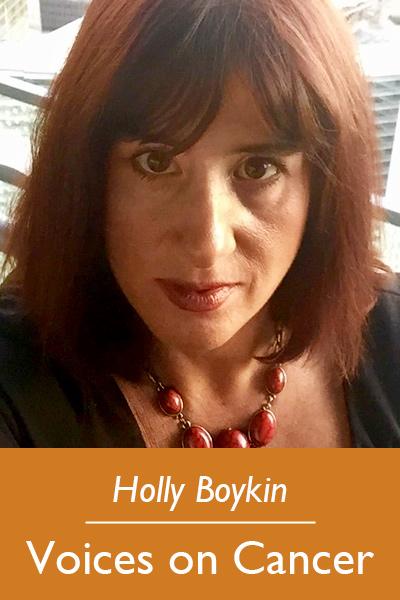
Voices on Cancer is a Cancer.Net Blog series where advocates share their stories and the lessons they have learned about being a cancer advocate. Holly Boykin is the Executive Director of the Head and Neck Cancer Alliance (HNCA), a global, nonprofit organization dedicated to saving lives via prevention, advocacy, research, patient resources, and expansion of treatment options. Holly has more than 25 years of experience in finance, governmental affairs, and nonprofit management. A former elected official in Stoughton, MA, Holly has been on the forefront of health care policy development. She holds a Master’s degree from Tufts University and volunteers on various boards.
My advocacy story
When you grow up in Boston, health care and politics are part of your childhood. At the corner store, on the stoops of homes, and at the dinner table, you’ll hear animated discussions about the internal and external economic and political influences on health care.
I wish I could say that cancer and other chronic diseases have not had a personal impact on my life. My nana was a colon cancer survivor, another nana had breast cancer that metastasized to other parts of her body, and my father-in-law passed away from complications related to his multiple myeloma. As a child, I had firsthand knowledge of the devastation that a disease could have on an individual and their family and friends. My dad’s closest friend, who was also my optometrist, had 5 children, and 4 of them had cystic fibrosis. I became close friends with each of them and was nearby when each of them died due to the disease. I vividly remember sitting by their bedsides, looking at them underneath the oxygen tent, and trying to maintain a balance between my being brave for them and my anger at the disease that was slowly killing my friend. Listening to the adults, I learned of the need for research, the need for better health care, and the financial hardship created by various diseases.
Over the years, I continued with both volunteer and professional positions in health care, finance, and government. By dedicating my life to health causes, I was honoring my friends and accepting the responsibility of speaking up for those who could not speak for themselves. Through the years, I learned about advocacy, economics, and public policy from both sides of the coin: as a local elected official and as a public health advocate on tobacco issues and access to health care. I studied pharmacoeconomics because I believe you need to understand the numbers to be a great advocate. Two years ago, I became the Executive Director of the Head and Neck Cancer Alliance. Seeing the passion of the clinicians and volunteers with this organization was empowering, and I wanted to be part of the team. Also, facing the challenge of building public awareness of head and neck cancer and of the rising public health issue of HPV-related cancer also piqued my interest.
April is Oral, Head and Neck Cancer Awareness Month. Why should we care? 
Oral, head, and neck cancer (OHNC) is relatively common. OHNC includes common forms of cancer that affect the oral cavity, pharynx, throat, thyroid, and larynx (voice box). Rates of these cancers are more than twice as high in men as in women. Cancer of the oral cavity is the ninth most common cancer among men, and the average age of diagnosis is 62. In the past 20 years, the incidence of human papillomavirus (HPV)-related oropharyngeal squamous cell carcinoma (OPSCC) has been increasing.
As the Executive Director of the Head and Neck Cancer Alliance, my goal is simple: SAVE LIVES. As part of that effort, we partner with other organizations around the world to raise awareness and provide free screenings for OHNC. Even with the increase of HPV-related diagnoses, the public has very little understanding of how OHNC can be prevented, what screening methods exist, and what the signs or symptoms are. This lack of knowledge can lead to the cancer going unnoticed until it has reached an advanced stage. Even more, patients are often unaware that they have HPV until after they are diagnosed with cancer.
In light of this increase in HPV-related cancers, the Head and Neck Cancer Alliance is actively working with others to promote HPV vaccination for boys and girls.
Tools for advocates
Being an advocate requires you to have multiple skills, perseverance, and a passion for the cause. Here are some recommendations to empower yourself and those you help:
-
Accept that health care is a business. Learn the various parts of how it operates.
-
Be able to talk about the finances and/or data. You will be amazed at how much more respect and momentum you get if you know this information.
-
Provide tools to empower patients, caregivers, and survivors. Speak for the concerns of everyone involved in the disease. You’d be surprised how often people will listen to you and you can enact change.
-
Think outside of the box. You will never have enough staff and resources. To achieve your mission, you will need to identify new methods and strategies to develop programs and services.
-
Don’t let fear keep you from working with other advocacy groups. While we may compete for funding, it is beneficial to work together to achieve common goals.
-
Programs and services benefit when there are positive and honest relationships with all stakeholders. Each stakeholder may represent a different interest, but by focusing on the shared mission and being honest about their limitations, together they are able to develop mutually beneficial programs.
